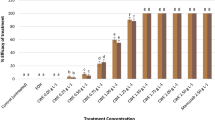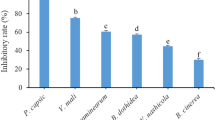Abstract
O-COUMARIC acid, a structural analogue of caffeic acid which forms part of the chlorogenic acid molecule, has been shown to inhibit the growth and sporulation of Venturia inaequalis, the causal fungus of apple scab. Sporulation was inhibited in culture and the incidence of disease was reduced, when inoculated shoot tips of the variety Cox's Orange Pippin were injected with an aqueous M/100 solution of sodium O-coumarate1. Spray applications of the acid have been ineffective, however, probably owing to lack of leaf penetration caused by the highly polar nature of the molecule.
This is a preview of subscription content, access via your institution
Access options
Subscribe to this journal
Receive 51 print issues and online access
$199.00 per year
only $3.90 per issue
Buy this article
- Purchase on Springer Link
- Instant access to full article PDF
Prices may be subject to local taxes which are calculated during checkout
Similar content being viewed by others
References
Kirkham, D. S., and Flood, A. E., J. Gen. Microbiol., 32, 123 (1963).
Kirby, A. H. M., and Hunter, L. D. (in preparation).
Author information
Authors and Affiliations
Rights and permissions
About this article
Cite this article
KIRKHAM, D., HUNTER, L. Systemic Antifungal Activity of Isobutyl O-Coumarate in Apple. Nature 201, 638–639 (1964). https://doi.org/10.1038/201638b0
Issue Date:
DOI: https://doi.org/10.1038/201638b0
This article is cited by
-
Screening, synthesis optimization, and scaling-up of phytopathogen antifungals derived from natural hydroxycinnamic acids
3 Biotech (2023)
-
Mise en évidence de l'activité systémique du Bénomyl par incorporation de la molecule fongicide dans la pâte à la lanoline
Biologia Plantarum (1973)
-
Physiology of resistance to fungal diseases in plants
The Botanical Review (1966)
Comments
By submitting a comment you agree to abide by our Terms and Community Guidelines. If you find something abusive or that does not comply with our terms or guidelines please flag it as inappropriate.



